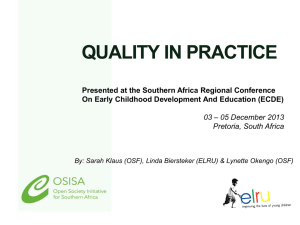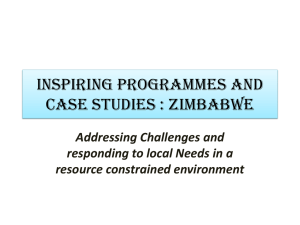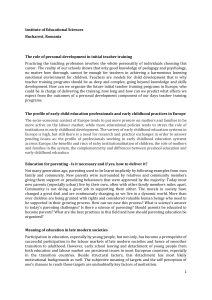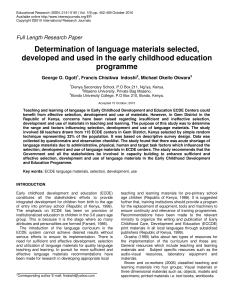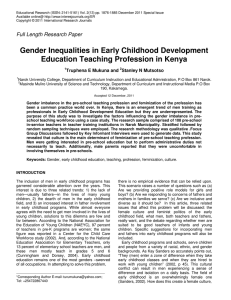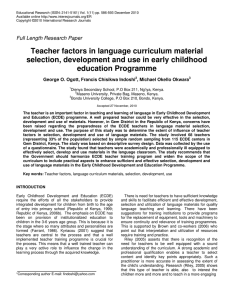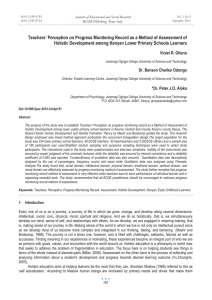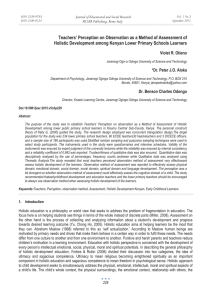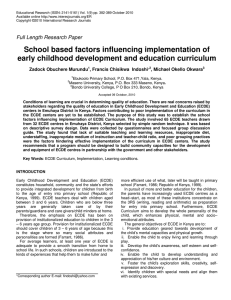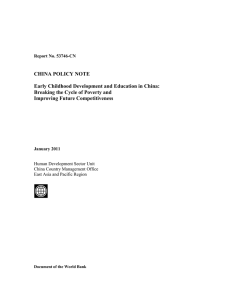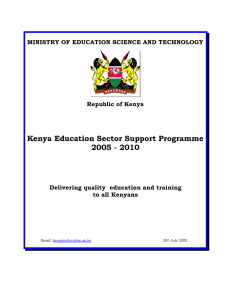ECDE and parenting
advertisement
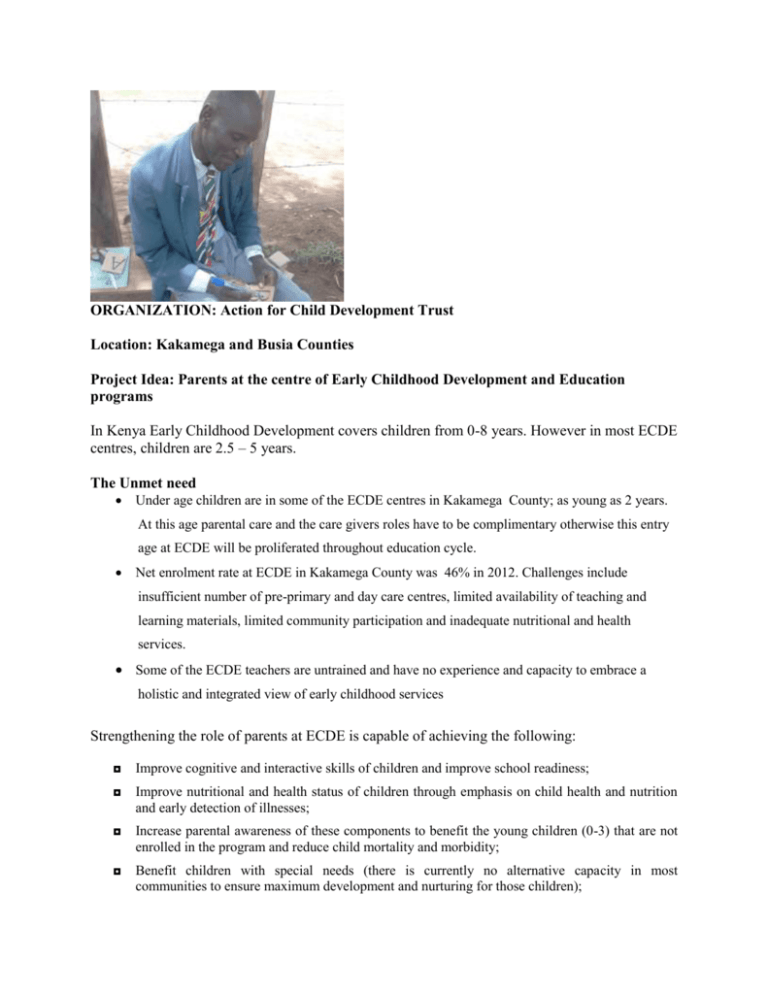
ORGANIZATION: Action for Child Development Trust Location: Kakamega and Busia Counties Project Idea: Parents at the centre of Early Childhood Development and Education programs In Kenya Early Childhood Development covers children from 0-8 years. However in most ECDE centres, children are 2.5 – 5 years. The Unmet need Under age children are in some of the ECDE centres in Kakamega County; as young as 2 years. At this age parental care and the care givers roles have to be complimentary otherwise this entry age at ECDE will be proliferated throughout education cycle. Net enrolment rate at ECDE in Kakamega County was 46% in 2012. Challenges include insufficient number of pre-primary and day care centres, limited availability of teaching and learning materials, limited community participation and inadequate nutritional and health services. Some of the ECDE teachers are untrained and have no experience and capacity to embrace a holistic and integrated view of early childhood services Strengthening the role of parents at ECDE is capable of achieving the following: ◘ Improve cognitive and interactive skills of children and improve school readiness; ◘ Improve nutritional and health status of children through emphasis on child health and nutrition and early detection of illnesses; ◘ Increase parental awareness of these components to benefit the young children (0-3) that are not enrolled in the program and reduce child mortality and morbidity; ◘ Benefit children with special needs (there is currently no alternative capacity in most communities to ensure maximum development and nurturing for those children); ◘ Benefit siblings in their education, as they wouldn’t have to take on the role of caretakers anymore. This would have a particular impact on girls’ retention rates in primary and secondary school. ◘ Create a better understanding by parents of their children’s holistic needs and equip them to provide a secure, nurturing and stimulating environment for their young ones. ◘ Community participation and ownership will contribute to the sustainability of the program ◘ Holistic child development is essential (cognitive, social, emotional, physical) ◘ Traditional education and childcare practices (from the parents perspective) combined with modern pedagogy ideas ◘ Partnership of NGO innovation with government health, education and welfare services ◘ Use of ECD centers as focal points for nutrition, health and wider community education ◘ Responsiveness to specific situations in a local context How it works Individual parents volunteer to take part in activities organized for children at school as resource persons. They may be asked by the teachers or offer their time and knowledge when requested. Parents can demonstrate different dances and games, tell stories, sing songs, riddles, and can also talk about safety, religion, health i.e. feeding habits and general behavior. Parents open days are organized at ECDE centers and parents visit and observe how children are learning, doing and experiencing at the ECDE centers. Parents support groups, who are small groups formed by parents in which they can comfortably work together in supporting their children’s learning. They share their experiences, challenges and successes that may be promoting or affecting their children’s development. Teacher acts as a facilitator address a variety of needs in a single session. Improves attendance, Same parents keep attending, Parents own the discussion and feel good about it, It is sustainable, Parents learn from each other’s experiences, Parents solve their own problems, Parents become motivated in participating in the discussion Parent’s mentors volunteer to support others with acceptable child rearing practices. Interested parents are identified, selected and matched to those parents who need outside parenting advice, support or friendship. Parent mentors can be a result of successful parent support group meetings. Home visits is where a parent /parents visit their fellow parents to share ideas about child rearing practices at home Parent’s workshops are when parents come to school to learn about a particular topic. They take part in discussions and activities. It increases parent’s awareness of how the methods used at school (active learning) and the curriculum supports children’s needs and interests. It enables the teachers and parents to discuss active learning principles in more details build a strong relationship between parents and people at school (teachers, SMCs & support staff.) What is new about the idea The increased space for parents at Early Childhood Development Education Centres increases cross learning between home environment and ECDE centre as an institution. Consequently diffusion of cultural and traditional parenting skills are enhanced at the Early Childhood Development Centre thus making child rearing relevant at the school level and for the community. Parents have an excellent opportunity to learn how learning and what their children learn in school to be able to reinforce the learning outside the Early Childhood Centre Environment. Early Childhood development is no longer full responsibility of care givers at Early Childhood Development Centres, but parents are also able to identify and play their roles. Immediate actions to test the idea Seek for immediate by in from Early Childhood Centre Committee leadership. Discuss and agree with school environment to invite parents for a discussion about the program. Seek support of local administration to help in the mobilization of parents. Work with experienced parents from the community and organizations implementing parenting and early childhood development program to refine the idea. How people can Help Video and DVD development which can be useful in the training process. Illustration and manual materials development for reference and training. Development of monitoring and evaluation system specific for such a program Documentations of the learning from the program
